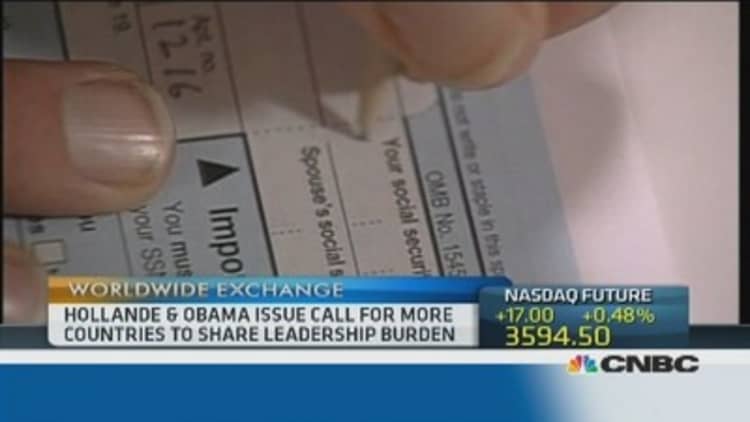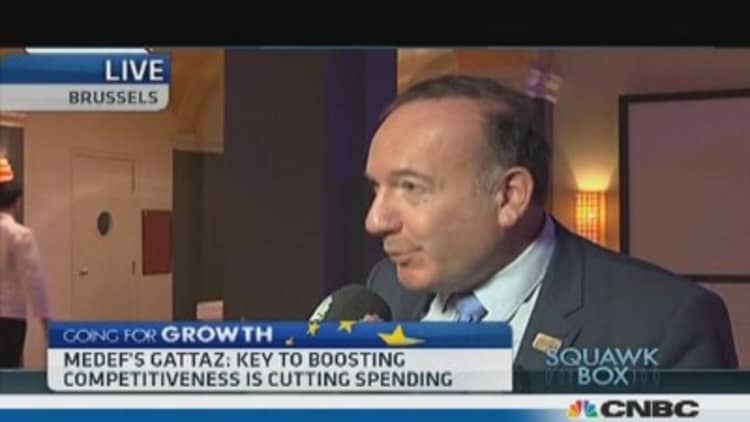It took a cheque for less than $20,000 and the promise of introductions to the right people to get start-up founder Solomon Hykes to forsake Paris for Silicon Valley.
The engineer founded DotCloud, an app building service, in France in 2008 with support from both private and public sector investment. But eventually, it needed more funding than he could find in France.
(Read more: A lot on Hollande's plate as he dines with Obama)
Not to mention a proper office. Mr Hykes could not find a landlord willing to rent to such a young company, leaving DotCloud and a few other start-ups cramped in a residential flat in central Paris owned by his friend's parents.
So when YCombinator, a prominent Silicon Valley seed investor known for nurturing early stage companies, offered to take on DotCloud, they took it.
Mr Hykes' story is one of the reasons François Hollande will on Wednesday become the first French president since François Mitterrand in 1984 to visit Silicon Valley.
More from the Financial Times:
Obama and the 'Five Eyes'
Disarray on right offers hope to Hollande
Businesses push Hollande on labour costs
There are now 60,000 French nationals in California, one of the biggest French diasporas. The French government is concerned both to sustain links with what otherwise might become a damaging brain drain and to persuade US companies that France itself is a good place to invest, despite its reputation for interventionism, high taxes and stifling labour regulations.
There certainly is an issue. A survey of US businesses in France by the American Chamber of Commerce in October showed 68 percent would not recommend France to a US company seeking to establish a business abroad.

In the other direction, DotCloud is one of dozens of French start-ups that have decamped to Silicon Valley, where the tech scene is more diverse and the pool of potential investors and customers larger than anywhere else in the world.
"This is the place to be if you're in the technology business – there are more opportunities per square kilometre [than anywhere else]," says Mr Hykes, who has raised $26m since arriving in the US in 2010.
As well as French expats, Mr Hollande will meet Californian political leaders and figures such as Eric Schmidt, chairman of Google, and Jack Dorsey, co-founder of Twitter.
(Read more: Vive la robotic revolution? Hollande's 10-year plan)
French expats say Mr Hollande faces a tough challenge in keeping the next generation of techies from leaving or luring those in the US back.
Part of the problem is that French policy can appear to make it more difficult to be a techie in Paris than in San Francisco. Last year, the government blocked an attempt by Yahoo to buy a majority stake in French online video website Daily Motion. It is also currently embroiled in a dispute over an effort to shield the traditional taxi industry by forcing car-share start-ups such as Uber to wait 15 minutes before picking up passengers.

The government has forced Amazon to stop offering free delivery in an attempt to protect book stores. It has fined Google for violating local privacy laws and is leading the charge to force online companies to pay more tax by stopping them channelling profits through low-tax jurisdictions.
"It must be interesting for [Hollande] to have lunch with Eric Schmidt," said French-born venture capitalist Jeff Clavier.
Despite those challenges, the prognosis for France's technology scene is by no means all negative.
Liam Boogar, a Silicon Valley native who three years ago set up Rude Baguette, a start-up blog based in Paris, says French tech entrepreneurs have been going to California since the 1980s. "They have probably done more good than harm to France. French engineers have a great reputation in the Valley, which France has underleveraged," he says.
Aware of this, the government is setting up a series of overseas "French tech hubs" in an attempt to capitalise on the tech diaspora, including attracting investment back into France.
(Read more: French president coming alone to White House this week)
A high level of skills and growing incentives, including one of Europe's most generous research tax write-off regimes, has seen companies such as Microsoft and Google setup R&D centres in France.
California start-up founder Michael Amar says he does much of his company's own engineering and development in France, as do other growing companies such as Talend, a big data analysis group.
Talend's co-founder Bertrand Diard recently told French newspaper LeMonde that engineers in France cost a third of their counterparts in Silicon Valley, where fierce competition for talent has driven up salaries. "France is a tax haven for research and development," he said. "More than that, [the engineers] are very good."
Many French expats now in the US do also eventually go back home, says Mr Clavier, who sees people returning after five to eight years abroad. In thelong run, he says, that opens France to new ideas and will help its companies connect better with foreign markets.
"All this experience of Silicon Valley exposure, New York exposure,London exposure, other emerging markets is good," he said. "A massive increase in young people with diplomas in their pockets leaving to go wherever the winds take them . . . is a very formative experience, and it doesn't mean that they've left forever."
Follow us on Twitter: @CNBCWorld

